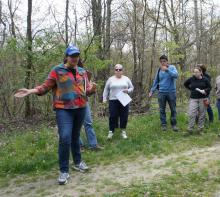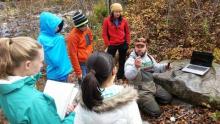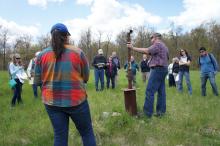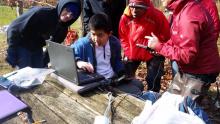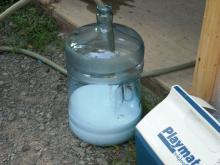A Network of Shale Water Researchers
Big data approach to water quality applied at shale drilling sites
By Matthew Carroll
UNIVERSITY PARK, Pa. — A computer program is diving deep into water quality data from Pennsylvania, helping scientists detect potential environmental impacts of Marcellus Shale gas drilling.
The work, supported by a new $1 million grant from the National Science Foundation, pairs a cross-disciplinary team of Penn State computer scientists and geoscientists studying methane concentrations in the state's streams, rivers and private water wells.
Conference takes aim at state’s orphan well problem
More than 150 years after the first commercial oil well was drilled in Pennsylvania, decades of energy exploration have resulted in hundreds of thousands of abandoned, lost and forgotten oil and gas wells scattered across the state.
Researchers at Penn State are among a number of organizations in Pennsylvania working to locate and assess these so called orphaned and abandoned wells, which if not properly plugged, or if damaged over time, can potentially cause air and water pollution.
State College high school students testing the waters at Black Mo
If anything happens to the water in Black Moshannon Creek, a group of State College Area School District earth science students might just be the first to know.
The teens, mostly from State High but with a few advanced eighth-graders thrown in, have been monitoring the watershed this year in partnership with researchers from Penn State’s Earth and Environmental Systems Institute.
The project, called TeenShale Network, gives students a chance to learn science exists outside of their textbooks and classrooms, and that their work can make a difference in the real world.
2016 Shale Network Workshop
The fifth annual Shale Network workshop took place May 19 and 20, drawing a large, diverse group including government workers, industry representatives, environmental group members, students and academics. About 97 people attended all or parts of the workshop, including a field trip, poster session, computer module and daylong session of presentations and discussions.
TeenShale Network returns to the field for another year
A group of local high school students are slipping into their hipwaders and wading back into the TeenShale Network.
With the school year back in full swing, students at State College High School have resumed work on the project, which pairs the youngsters with Penn State researchers to monitor water quality in Black Moshannon Creek.
This year, 28 students are taking part in TeenShale network, ranging from 8th to 11th grade. They will build on work the returning students have done the past three years, and search for their own hypotheses in their data.
Shale Network database can now be cited using DOI
The Shale Network datasets now have a DOI, or Digital Object Identifier, that can be used when citing the data in publications.
To access the datasets through a DOI, visit a DOI resolver, like the one found at www.crossref.org/05researchers/58doi_resolver.html, and enter 10.4211/his-data-shalenetwork
To database should be cited as: ShaleNetwork Database. DOI: 10.4211/his-data-shalenetwork
Shale Network fosters collaboration, focuses on water quality
STATE COLLEGE, Pa. — A diverse group — from natural gas industry representatives to environmental advocates — gathered recently to discuss the impact of gas drilling on waterways at the 2015 Shale Network conference.
The annual workshop gives scientists a chance to share what they’ve learned over the last year about the impact of Marcellus shale gas drilling on the region’s streams and rivers, and to plan the best way to monitor water quality going forward.
State High students partner with Penn State to monitor water quality
By Hannah Good, Emily Richmond and Valeria Soler Pelaez
RUSH TOWNSHIP, Pa. -- The boots Maria Rodriguez-Hertz wore kept out the water but not the numbing cold from Black Moshannon Creek.
Rodriguez-Hertz, a State College high school sophomore, waded into the stream along with her classmates to collect water samples and record data for the TeenShale Network.
New technique shows shale-drilling additives in drinking-water taps near leak
Substances commonly used for drilling or extracting Marcellus shale gas foamed from the drinking water taps of three Pennsylvania homes near a reported well-pad leak, according an analysis from a team of scientists.
